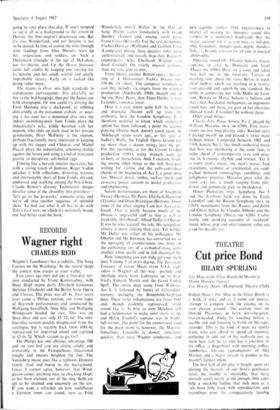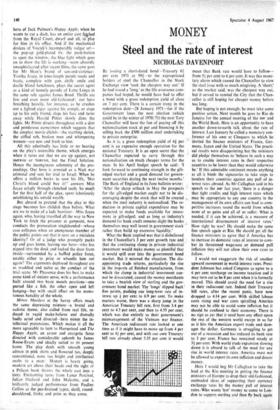THEATRE
Cut price Bond
IIILARY SPURLING
The Happy Apple (Hampstead Theatre Club) Robert Shaw's The Man in the Glass Rooth is a bold, if risky and as it turns out unwise, attempt to compete with the cinema on its own chosen ground. The curtain rises on Donald Pleasence, In lurex dressing-gown, shaven-headed, dimly lit, kneeling before a marble urn and listening to Verdi on the tape- recorder. This is the kind of man, we slowly learn, who can afford to spend all morning pottering in and out of his wall-safe just to show how rich he is; who has a juke-box in his office, a fingerbowl with morning coffee, numberless life-size reproductions of Old Masters and a negro servant to pander to his master's lightest whim.
The first half of the play is largely spent ex- ploring the marvels of our hero's penthouse suite; the trouble is, inevitably, that these marvels aren't nearly grand enough. One can't help a sneaking feeling that rich men as a rule have little truck with reproductions and recordings--even the comparatively humble
hero of Jack Pulman's Happy Apple. when he wants to cut a dash, has an entire cast-. %Wiled from the Royal Court, dwarf and all, too play for him in his office. And if the mechanical devices of Voytek's incomparably vulgar set— the pop-up gold-plated Tv. the push-button to open the window, the blue light which goes on to show the lift is working—seem absurdly unsophisticated after recent films, the same goes for Mr Shaw's brand of sex-and-violence: Yootha Joyce, in knee-length purple suede and boots, complete with gun, chilly smile and docile blond henchmen, plays the secret agent as a kind of homely parody of Lotte Lenya in the same role against James Bond. Thrills are few and even more old-fashioned our hero breathing heavily, for instance, as he crushes out a lighted cigar against his armpit, or steps up to his only friend, slaps his face and turns away while Harold Pinter slowly dims the lights. Mr Pinter directs throughout with a dim and ponderous earnestness which suggests that the simplest movie clichés—the startling shriek, the stifled sob, broken men and whimpering women—are new and fresh to him.
All this admittedly has little or no bearing on the play's ostensible theme, which emerges when it turns out that we are up against, not SMERSH or THRUSH, but the Final Solution. Hence the incongruous solemnity of the pro- ceedings. Our hero is arrested as a Nazi war criminal and sent for trial to Israel. When he offers a million bucks to save his life, 'Not Christ's blood could buy it!' answers Miss 'Joyce crisply through clenched teeth. So much for the first half of the play, spent laboriously establishing his untold wealth.
But absurd to pretend that the play at this stage becomes less childish than before. What are we to make of a lady barrister--Miss Joyce again, who, having travelled all the way to New York to fetch the prisoner at gunpoint, now conducts the prosecution singlehanded—whose case collapses when an anonymous member of the public points out that it rests on a mistaken identity? Or of a judge who promptly packs up and goes home, leaving our hero—who has nipped into the dock and locked the door from inside—surrounded by a baffled police force, unable either to prise or wheedle him out again? The arguments deployed throughout are as muddled and naive as the conduct of the trial scene. Mr Pleasence does his best to make some kind of sinister sense, with a performance built around two basic mouth positions—one pursed like a fish, the other open and left hanging—but with small effect on the mono- tonous banality of the whole.
Minor Murders at the Savoy offers much the same depressing mixture—a brutal and sadistic theme, also culled from real life, re- duced to vapid make-believe and dismally badly acted and directed—here minus the in- tellectual pretensions. Which makes it all the more agreeable to turn to Hampstead and The Happy Apple, an astute and energetic farce directed with considerable aplomb by James Roose-Evans and ideally suited to its present home. The play deals with smooth young admen in pink shirts and flowered ties, deeply conventional, none too bright and intellectual snobs to a man : Mozart is heavy going, modern art above ,their heads and the sight of a Pelican book throws the whole cast into a tizzy. Enchanting turns from Lance Percival, Julian Orchard and John Malcolm, and a brilliantly judged performance from Pauline Collins as the pea-brained typist, shrill, round- shouldered, frisky and prim as they come.































 Previous page
Previous page